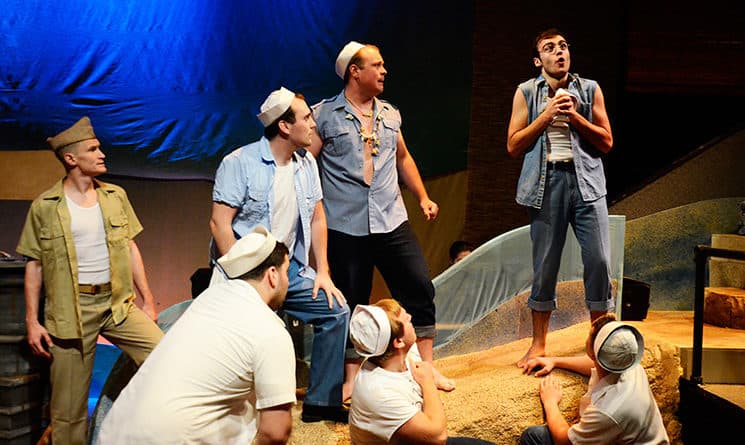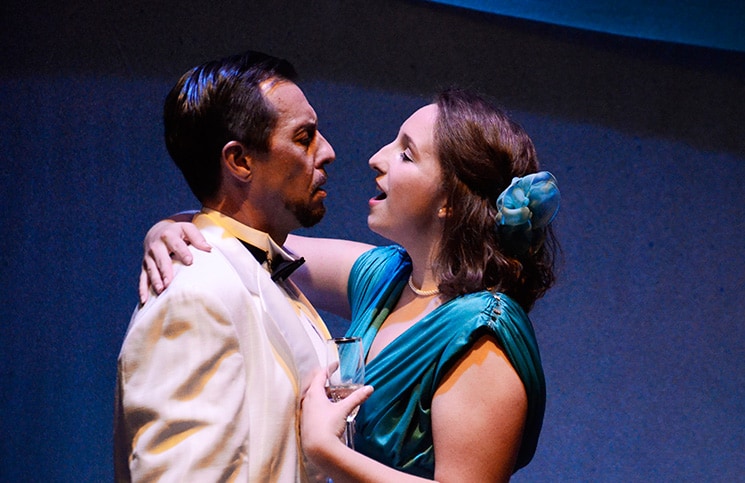There is no better American song than Rodgers and Hammerstein’s “Some Enchanted Evening.” It is a song that feels like exactly what it says. You know it well: “Some enchanted evening / You may see a stranger / You may see a stranger / across a crowded room.” The rising melody of the first three lines mirrors the act of scanning a crowd and even doing the double-take the lyrics describe. The repeated high notes linking the third and fourth lines evoke a connection being made and drawn nearly taut. And the descending melody accompanying “crowded room” illustrates perfectly the feeling of having reached a safe place. Sung early in “South Pacific,” on stage at the Seacoast Repertory Theatre through Aug. 2, by the besotted French fugitive Emile De Becque to the flaky but sincere American nurse Nellie Forbush, the song adumbrates the show’s musical motifs, as well as its narrative trajectory and heady themes: the rush of love, the struggle for acceptance and forgiveness, and the search for home.
The challenge of mounting “South Pacific” is to take this and the show’s other canonical songs and make them heard — heard, that is, as intimate expressions of spontaneous feeling, and not as beautiful but brittle versions of themselves. In this respect, director Danielle Howard is stunningly successful. Even the most cynical or veteran theatergoer should discover new beauty and profundity in these songs as performed by the accomplished cast and the two accompanying pianists.
The show has a secondary challenge, however: to take the puzzling and ambiguous racial politics of “South Pacific” and explore them — closely enough that their perilous power is revealed, but carefully enough that they do not detonate. Here, Howard is less successful. She steers the show at a clumsily cautious distance from its political mines, so that we’re not even sure they exist at all. Merely staging “South Pacific” is not enough; it must be guided with vision and conviction.
“South Pacific” is both a military melodrama and a meditation on American prejudice.
“South Pacific” is set on an unnamed Polynesian island during World War II. Although the theater of war was bloody, its dangers feel far-off. Instead, the soldiers stationed here are concerned with quenching their unsatisfied libidos, securing native goods for resale, and planning and performing the Thanksgiving variety show. Ensign Nellie Forbush (Allie Wing), a self-described “hick” from Little Rock, has met and fallen in love with Emile De Becque (Paul Soper), a French planter on the island; he has, in turn, fallen for her, but her mother, in letters from home, discourages her from investing fully in the relationship. Meanwhile, Luther Billis (Kevin Mahaney), a low-ranking but high energy Marine on the American base, is busier cultivating commercial contacts among the native people than contributing to the war effort. His primary contact, his equal in vigor and superior in cunning, is Bloody Mary (Linette Roungchun), who seems to conceal as much as she cajoles.
When Lieutenant Joseph Cable (Connor McGrath) arrives on a mission to infiltrate a nearby island occupied by the Japanese army, these stories are braided into a single terminal strand. Cable is urged to consider recruiting De Becque to assist on the mission, and Nellie is asked to leverage her intimacy with De Becque to spy on him; Bloody Mary introduces Cable to her daughter, Liat (Sara LaFlamme), hoping they will marry and leave the island together, and Luther accompanies Cable to the mystical island Bali Ha’i, where Luther enjoys a ritual ceremony. Events speed toward a tragic conclusion.
The show is both a military melodrama and a meditation on American prejudice. In addition to Nellie’s mother, Nellie herself is revealed to harbor reflexive dislike of ethnic “others”; Cable is similarly exposed. But the musical has a famously fraught relationship with race. While the characters wrestle with their assumptions and antipathies, Rodgers and Hammerstein themselves perhaps give in to theirs too easily. The line between the characters’ and the authors’ racial perceptions is hazy, and this production does little to examine or clarify it.
As Bloody Mary, who is both the story’s most powerful character and the show’s most overwrought stereotype, Roungchun revels in this ambiguity. She clearly enjoys the exaggerated portrayal of native speech called for by the script and delivers it with a hard, adenoidal edge; just as Bloody Mary draws strength from teasing and pleasing the American G.I.s’ expectations of Polynesian customs, so too does Roungchun herself from playing to the audience. In her performance of the classic “Bali Ha’i,” her playfulness reaches its ambivalent apotheosis. Sung in a combination of her character’s unrefined accent and her own well-trained diction, the song is transcendent and strange, discomfiting and revelatory. It is the most beautiful moment I have seen on a Seacoast stage and may, by itself, be worth the price of admission.
Alas, the show doesn’t end there. The second act is as perfunctory as the first is promising. The actors lose their intensity, and the scenes feel instrumental and diffuse. With fewer (not to mention lesser) songs and more narrative movement, the act demands energy and focus that the cast cannot muster, though there are exceptions. Mahaney, spry and full-bodied as Luther in the first act, is nearly manic in the second, as though to compensate for the widespread torpor around him. As Nellie, the show’s protagonist, Wing presses on. Her voice is strong, though not especially distinguished, and her sense of her character’s desires and strengths seems to gain substance. As De Becque, Soper provides a passionate and captivating operatic bass, but less poised acting. And, as Cable, McGrath is a bit wan; he has a pleasant singing voice — though its pop inflections project an idea of feeling, rather than feeling itself — but he fails to hold our attention when he speaks.
The Rep’s production finds something new in many of the songs that we might have assumed were exhausted and inert; if only similar care had been expended to understand and, through inquiry and critique, revivify the rest of the script. Still, to paraphrase another great American drama, we’ll always have “Bali Ha’i.”
“South Pacific” is on stage through Aug. 2 at the Seacoast Repertory Theatre, 125 Bow St., Portsmouth. For tickets and showtimes, call 603-433-4793 or visit seacoastrep.org.


